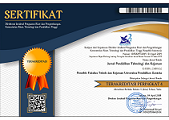PENGEMBANGAN MEDIA BELAJAR PUPUH BERBASIS ANDROID
DOI:
https://doi.org/10.23887/jptk-undiksha.v11i2.4084Abstract
Pupuh is one of the four types of songs that exist in Bali. Pupuh is used to express advices, stories of heroism and feelings that usually shown on dramatari which is developedin Bali such as drama gong, arja and Bondres. This Media Belajar Pupuh Berbasis Android is a learning media pupuh with an Android device. This research aims to design and
implement application design Media Belajar Pupuh Berbasis Android.
Development of the Media Belajar Pupuh Berbasis Android is using the software development life cycle SDLC (Software Development Life Cycle) with the waterfall model.
Features in this application are intended as a learning pupuh for users with an Android
device. The features of this application are the theory of pupuh, uger-uger of pupuh, tunings of pupuh, songs of pupuh and recordings of the user.
The result of this research is the design and implementation of the Media Belajar
Pupuh Berbasis Android that has been successfully carried out. The design is done by using a functional model of the UML (Unified Modeling Language). Implemented in Java
programming language using the Eclipse editor and ADT (Android Development Tools) plug- ins, and also using AndEngine as additional libraries. The entire functional requirements
have been successfully implemented in accordance with the design.
Downloads
Published
2014-08-01
Issue
Section
JPTK
License
Authors who publish with the JPTK agree to the following terms:- Authors retain copyright and grant the journal the right of first publication with the work simultaneously licensed under a Creative Commons Attribution License (CC BY-SA 4.0) that allows others to share the work with an acknowledgment of the work's authorship and initial publication in this journal
- Authors are able to enter into separate, additional contractual arrangements for the non-exclusive distribution of the journal's published version of the work (e.g., post it to an institutional repository or publish it in a book), with an acknowledgment of its initial publication in this journal.
- Authors are permitted and encouraged to post their work online (e.g., in institutional repositories or on their website) prior to and during the submission process, as it can lead to productive exchanges, as well as earlier and greater citation of published work. (See The Effect of Open Access)












